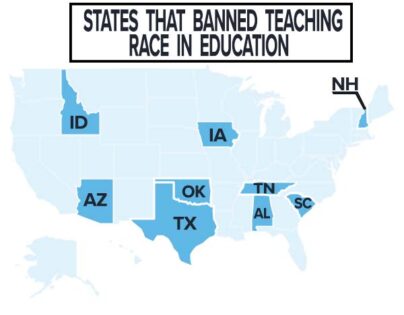Critical Race Theory allows for individuals to see the racial inequities within education, history, politics, and law. Art by Nova Blanco-Rico
By Nova Blanco-Rico, Managing Editor
Zoe Davis grew up like any other child, with the occasional growth spurts, acne breakouts, and the constant uncertainty of what the future holds, but Davis, like many, had one unremovable trait that left her feeling ashamed – the color of her skin.
“I felt like I [was] ugly growing up… I got rejected because of my color,” Davis said.
Davis, a senior clinical lab science major at California State University, Dominguez Hills, attended school in the United States her whole life and learned history through a eurocentric lens, sidelining the systemic injustices faced by people of color throughout American history.
“I grew up in a non-black household, so when you’re the only black kid living with your family and all of my family is Latinx, it’s a little hard to understand each other,” Davis said. “I think it is very important to learn each race fairly.”
Critical Race Theory (CRT) is the idea that race is fluid and subject to change. It argues how racism is not only an individual prejudice but is engrained in institutions and legal systems. This 40-year-old idea was primarily taught in high-education law courses but is now used to examine racial inequities within American education.
Dr. Donna Nicol, chair of the Africana studies department at CSUDH, explains CRT is a way of thinking critically to improve the country by making it a place where everyone can live safely and comfortably, no matter their race. As she claimed, CRT is not a course and it doesn’t teach kids how to hate America or their race.
“Nothing in critical race theory says [supporters] hate America. In fact, they actually want to improve America,” said Nicol.
CRT has been a prominent subject point in many debates within the past year because the National Education Association, the largest labor union in the United States representing educators, has actively supported the teaching of CRT within K-12.
“CRT helps students analyze narratives which obscure the impact that racism has had [on] American history, politics, and culture,” Nicol said.
Republicans have rejected CRT, defining it as the teaching of demonizing white privilege and promoting anti-racism ideas. They also believe that it will create a divide between races and that it will teach kids to hate America.
In California, the city of Paso Robles School District bans parts of CRT.
“I find critical race theory to be just an absolutely disgustingly racist ideology that has been developed with the intention of really driving a wedge between various groups in America, various ethnic groups, and to use that to absolutely ruin our nation,” Chris Arend, school board president of Paso Robles Joint Unified School District, said in an interview with Fox News.
Over nine states in the U.S. have passed legislation that would ban any discussion that any race, sex, ethnicity, and religion are inherently superior or inferior. Though not explicitly mentioning CRT within the bills, besides Idaho, the legislation hits on points of the theory.

The discussion of race has always been a sensitive and controversial one. Many believe racial injustices in America are no longer an issue, while others live through it now.
One afternoon in July, Davis and her boyfriend were walking back to their car to get some clothes after swimming in a community pool. While in their car, two white police officers knocked on their window and asked what they were doing there.
“They came because we were getting accused of stealing cars when we have a car ourselves,” Davis said.
They were then told to remain silent and to get out of their vehicle.
“They decided to pat us down even though we were in our swimsuits, which I considered harassment,” Davis said. “That’s not my first moment of racism but this is my most recent.”
USA Today conducted a national poll that found only 37% of white parents care to implement CRT, in contrast to 83% of Black parents.
“I think that those folks who are dismissive of Critical Race Theory, don’t want to deal with the ugliness of American history,” said Nicol. “They don’t want to deal with the way in which our society works, divided along with race, and then don’t want to deal with the privileges that come to certain races and the disadvantages that go to others.”
The suppression of CRT including the talk of race and racism within schools is concerning to the overall purpose of education and progress.
“I feel like if I were to have learned that history as a kid and I were to have gotten taught at a younger age, I would have been stronger as a child and embraced my race more,” said Davis.

